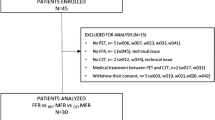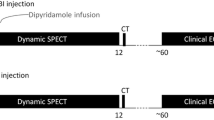Abstract
Objective
Estimation of myocardial blood flow (MBF) and coronary flow reserve (CFR) by SPECT myocardial perfusion imaging (MPI) remains challenging. Our aim was to approximate MBF and CFR by quantifying the absolute Tc-99m tetrofosmin retention in the myocardium via gated-SPECT/CT MPI.
Methods
Tracer retention was calculated on the basis of the microsphere kinetic model and served as an index of MBF at stress and rest (sMBFi, rMBFi). CFR was given by the sMBFi/rMBFi ratio. A planar first-pass acquisition during dipyridamole stress and at rest provided the data for tracer input determination. The input was represented by the integral of a gamma variate fitted on the time-activity curve of the left ventricle. Gated-SPECT/CT was performed 1 h post tracer injection and myocardial activity was measured in attenuation-corrected transaxial slices by a threshold VOI. The input was also compensated for tissue attenuation by measuring the distance from the centre of the left ventricle to the body surface on fused SPECT/CT slices. Input and uptake results were adjusted for planar-SPECT counting geometry differences by the aid of a phantom experiment. Thirty-nine subjects with low probability of coronary artery disease (CAD), age lower than 75 years and normal MPI (control group) were compared with 57 patients with documented CAD (CAD group).
Results
CFR and sMBFi values of CAD patients (1.39 ± 0.37 and 1.42 ± 0.35 ml/min/g) were considerably lower (p < 0.0001) than controls (1.68 ± 0.25 and 1.72 ± 0.37 ml/min/g). Significant difference in CFR (p = 0.03) was also noted between CAD patients with normal MPI (1.48 ± 0.38) and controls. However, sMBFi managed to discriminate certain CAD subgroups (normal MPI/ischemia/scar/scar and ischemia) more efficiently than CFR. Maximum heart rate-blood pressure product (RPP) during stress was an independent predictor of sMBFi and CFR. The other independent CFR correlates were resting RPP and diabetes mellitus, while sMBFi was associated with age, sex, smoking, and stress perfusion defects.
Conclusions
Despite the low myocardial extraction fraction of Tc-99m tetrofosmin, an approximation of MBF and CFR is feasible with gated-SPECT/CT MPI. These flow indices together were able to discriminate CAD patients from controls and stratify different patient subgroups.







Similar content being viewed by others
References
Schindler TH, Schelbert HR, Quercioli A, Dilsizian V. Cardiac PET imaging for the detection and monitoring of coronary artery disease and microvascular health. JACC Cardiovasc Imaging. 2010;3:623–40.
Saraste A, Kajander S, Han C, Nesterov SV, Knuuti J. PET: is myocardial flow quantification a clinical reality? J Nucl Cardiol. 2012;19:1044–59.
Berman DS, Germano G, Slomka PJ. Improvement in PET myocardial perfusion image quality and quantification with flurpiridaz F 18. J Nucl Cardiol. 2012;19(Suppl 1):S38–45.
Hajjiri MM, Leavitt MB, Zheng H, Spooner AE, Fischman AJ, Gewirtz H. Comparison of positron emission tomography measurement of adenosine-stimulated absolute myocardial blood flow versus relative myocardial tracer content for physiological assessment of coronary artery stenosis severity and location. JACC Cardiovasc Imaging. 2009;2:751–8.
Fiechter M, Ghadri JR, Gebhard C, Fuchs TA, Pazhenkotti AP, Nkoulou RN, et al. Diagnostic value of 13N-ammonia myocardial perfusion PET: added value of myocardial flow reserve. J Nucl Med. 2012;53:1230–4.
Crea F, Camici PG, Bairey Merz CN. Coronary microvascular dysfunction: an update. Eur Heart J. 2014;35:1101–11.
Herzog BA, Husmann L, Valenta I, Gaemperli O, Siegrist PT, Tay FM, et al. Long-term prognostic value of 13N-ammonia myocardial perfusion positron emission tomography added value of coronary flow reserve. J Am Coll Cardiol. 2009;54:150–6.
Ziadi MC, Dekemp RA, Williams KA, Guo A, Chow BJ, Renaud JM, et al. Impaired myocardial flow reserve on rubidium-82 positron emission tomography imaging predicts adverse outcomes in patients assessed for myocardial ischemia. J Am Coll Cardiol. 2011;58:740–8.
Brunken RC. Challenges for measurement of myocardial perfusion and perfusion reserve by SPECT imaging. J Nucl Cardiol. 2007;14:145–9.
Taki J, Fujino S, Nakajima K, Matsunari I, Okazaki H, Saga T, et al. (99m)Tc-sestamibi retention characteristics during pharmacologic hyperemia in human myocardium: comparison with coronary flow reserve measured by Doppler flowire. J Nucl Med. 2001;42:1457–63.
Sugihara H, Yonekura Y, Kataoka K, Fukai D, Kitamura N, Taniguchi Y. Estimation of coronary flow reserve with the use of dynamic planar and SPECT images of Tc-99m tetrofosmin. J Nucl Cardiol. 2001;8:575–9.
Ito Y, Katoh C, Noriyasu K, Kuge Y, Furuyama H, Morita K, et al. Estimation of myocardial blood flow and myocardial flow reserve by 99mTc-sestamibi imaging: comparison with the results of [15O]H2O PET. Eur J Nucl Med Mol Imaging. 2003;30:281–7.
Storto G, Cirillo P, Vicario ML, Pellegrino T, Sorrentino AR, Petretta M, et al. Estimation of coronary flow reserve by Tc-99m sestamibi imaging in patients with coronary artery disease: comparison with the results of intracoronary Doppler technique. J Nucl Cardiol. 2004;11:682–8.
Vicario ML, Cirillo L, Storto G, Pellegrino T, Ragone N, Fontanella L, et al. Influence of risk factors on coronary flow reserve in patients with 1-vessel coronary artery disease. J Nucl Med. 2005;46:1438–43.
Pellegrino T, Storto G, Filardi PP, Sorrentino AR, Silvestro A, Petretta M, et al. Relationship between brachial artery flow-mediated dilation and coronary flow reserve in patients with peripheral artery disease. J Nucl Med. 2005;46:1997–2002.
Storto G, Pellegrino T, Sorrentino AR, Luongo L, Petretta M, Cuocolo A. Estimation of coronary flow reserve by sestamibi imaging in type 2 diabetic patients with normal coronary arteries. J Nucl Cardiol. 2007;14:194–9.
Storto G, Sorrentino AR, Pellegrino T, Liuzzi R, Petretta M, Cuocolo A. Assessment of coronary flow reserve by sestamibi imaging in patients with typical chest pain and normal coronary arteries. Eur J Nucl Med Mol Imaging. 2007;34:1156–61.
Marini C, Giusti M, Armonino R, Ghigliotti G, Bezante G, Vera L, et al. Reduced coronary flow reserve in patients with primary hyperparathyroidism: a study by G-SPECT myocardial perfusion imaging. Eur J Nucl Med Mol Imaging. 2010;37:2256–63.
Daniele S, Nappi C, Acampa W, Storto G, Pellegrino T, Ricci F, et al. Incremental prognostic value of coronary flow reserve assessed with single-photon emission computed tomography. J Nucl Cardiol. 2011;18:612–9.
Heymann MA, Payne BD, Hoffman JI, Rudolph AM. Blood flow measurements with radionuclide-labeled particles. Prog Cardiovasc Dis. 1977;20:55–79.
Petretta M, Soricelli A, Storto G, Cuocolo A. Assessment of coronary flow reserve using single photon emission computed tomography with technetium 99m-labeled tracers. J Nucl Cardiol. 2008;15:456–65.
Diamond GA, Forrester JS. Analysis of probability as an aid in the clinical diagnosis of coronary-artery disease. N Engl J Med. 1979;300:1350–8.
Wolfe CL, Jansen DE, Corbett JR, Lipscomb K, Gabliani G, Filipchuk N, et al. Determination of left ventricular mass using single-photon emission computed tomography. Am J Cardiol. 1985;56:761–4.
Czernin J, Müller P, Chan S, Brunken RC, Porenta G, Krivokapich J, et al. Influence of age and hemodynamics on myocardial blood flow and flow reserve. Circulation. 1993;88:62–9.
Chareonthaitawee P, Kaufmann PA, Rimoldi O, Camici PG. Heterogeneity of resting and hyperemic myocardial blood flow in healthy humans. Cardiovasc Res. 2001;50:151–61.
Ben-Haim S, Murthy VL, Breault C, Allie R, Sitek A, Roth N, et al. Quantification of myocardial perfusion reserve using dynamic SPECT imaging in humans: a feasibility study. J Nucl Med. 2013;54:873–9.
Patton JA, Turkington TG. SPECT/CT physical principles and attenuation correction. J Nucl Med Technol. 2008;36:1–10.
Slomka PJ, Berman DS, Germano G. Absolute myocardial blood flow quantification with SPECT/CT: is it possible? J Nucl Cardiol. 2014;21:1092–5.
Hsu B, Chen FC, Wu TC, Huang WS, Hou PN, Chen CC, et al. Quantitation of myocardial blood flow and myocardial flow reserve with (99m)Tc-sestamibi dynamic SPECT/CT to enhance detection of coronary artery disease. Eur J Nucl Med Mol Imaging. 2014;41:2294–306.
Klein R, Hung GU, Wu TC, Huang WS, Li D, deKemp RA, et al. Feasibility and operator variability of myocardial blood flow and reserve measurements with (99m)Tc-sestamibi quantitative dynamic SPECT/CT imaging. J Nucl Cardiol. 2014;21:1075–88.
Hesse B, Tägil K, Cuocolo A, Anagnostopoulos C, Bardiés M, Bax J, EANM/ESC Group, et al. EANM/ESC procedural guidelines for myocardial perfusion imaging in nuclear cardiology. Eur J Nucl Med Mol Imaging. 2005;32:855–97.
Higley B, Smith FW, Smith T, Gemmell HG, Das Gupta P, Gvozdanovic DV, et al. Technetium-99m-1,2-bis[bis(2-ethoxyethyl) phosphino]ethane: human biodistribution, dosimetry and safety of a new myocardial perfusion imaging agent. J Nucl Med. 1993;34:30–8.
Sinusas AJ, Shi Q, Saltzberg MT, Vitols P, Jain D, Wackers FJ, et al. Technetium-99m-tetrofosmin to assess myocardial blood flow: experimental validation in an intact canine model of ischemia. J Nucl Med. 1994;35:664–71.
Tio RA, Dabeshlim A, Siebelink HM, de Sutter J, Hillege HL, Zeebregts CJ, et al. Comparison between the prognostic value of left ventricular function and myocardial perfusion reserve in patients with ischemic heart disease. J Nucl Med. 2009;50:214–9.
Glover DK, Ruiz M, Yang JY, Smith WH, Watson DD, Beller GA. Myocardial 99mTc-tetrofosmin uptake during adenosine-induced vasodilatation with either a critical or mild coronary stenosis: comparison with 201Tl and regional myocardial blood flow. Circulation. 1997;96:2332–8.
Beller GA, Bergmann SR. Myocardial perfusion imaging agents: SPECT and PET. J Nucl Cardiol. 2004;11:71–86.
Conflict of interest
The authors declare no conflict of interest.
Author information
Authors and Affiliations
Corresponding author
Rights and permissions
About this article
Cite this article
Apostolopoulos, D.J., Kaspiri, A., Spyridonidis, T. et al. Assessment of absolute Tc-99m tetrofosmin retention in the myocardium as an index of myocardial blood flow and coronary flow reserve by gated-SPECT/CT: a feasibility study. Ann Nucl Med 29, 588–602 (2015). https://doi.org/10.1007/s12149-015-0982-6
Received:
Accepted:
Published:
Issue Date:
DOI: https://doi.org/10.1007/s12149-015-0982-6




